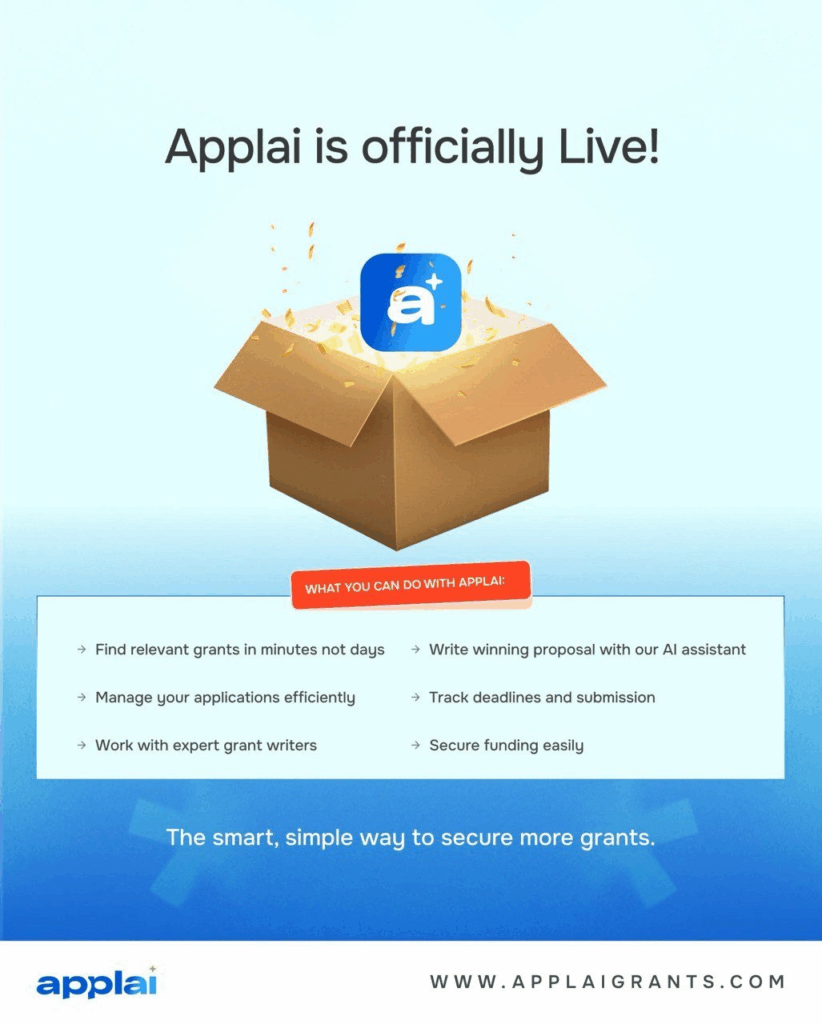Bridging the funding gap: Chuma Aroh’s Applai is giving African entrepreneurs a fighting chance

It was at an Abuja event organised by the Small and Medium Enterprises Development Agency of Nigeria (SMEDAN). Hundreds of entrepreneurs and founders filled the venue, each one hungry for ways to grow their businesses. Chuma Aroh, a man with years of experience in grant writing and investment analysis, moved through the crowd and saw the struggle.
Chuma listened to their stories, their passions, and their struggles. One theme kept surfacing. These founders were doing incredible work, solving real problems in their communities, but they had no clue about government grants tailored just for them. Funding felt out of reach, and it weighed heavily on their dreams.
“I realised that I had identified this problem and had been unconsciously solving it for a while,” Chuma recalls. “During my time at TVCLabs, I’d met over 300 founders, and the question I heard most often wasn’t about pitch decks or valuations. It was ‘Chuma, where can I find grants?’”
He used to dig into research himself, hunting down opportunities and passing them along one by one. He played the middleman, connecting great founders with funding. That day in Abuja, everything clicked.
“What if I could build something that automatically identified the right grants for each founder?” he thought. That spark ignited Applai.
Applai is designed to ease the grant-seeking burden, especially in Africa. It leans on AI to pair grant seekers with the right opportunities, streamline applications, and offer tools for reporting impact.
Chuma pinpointed five major hurdles African grant seekers face, hurdles Applai tackles head-on.
Grant seeking in Africa is incredibly difficult, he argues. “Entrepreneurs should be spending 80% of their time building their venture and making an impact, and only 20% chasing grants. But in Africa, it’s often the complete reverse.” He lists the challenges plainly:
- Research paralysis: “Where does the average founder even start looking for grants? Most spend hours digging through random blogs filled with ads, or trying to make sense of endless government lists that weren’t designed with entrepreneurs in mind. It almost makes searching for grants a full-time job. I know that, because that used to be my job.”
- Eligibility confusion: “How do you know if your organisation is a good fit for a particular grant? One of the biggest reasons applications fail is that there’s a fundamental disconnect between what the grant criteria require and what the venture does.”
- Writing skills gap: “Grant writing is incredibly specialised. For founders who don’t have that expertise, how can they structure proposals, letters of intent, or business plans that can compete against organisations that have big budgets for professional grant consultants? In the end, it becomes an impossible battle to win.”
- Deadline management chaos: “Most entrepreneurs are trying to manage their team, grow their venture, maybe chase equity investments, and somehow stay on top of multiple grant deadlines. It can be so overwhelming, and when they squeeze out time to finish their applications, many discover that they missed critical submission dates.”
- Impact reporting struggles: “Even after securing the grant, you’re bound by strict reporting and monitoring requirements. Organisations that can’t demonstrate their impact properly often miss out on renewal opportunities.”
Chuma built Applai to flip that 80-20 split back where it belongs. “Our AI helps any user, regardless of their writing background, create applications that present their ideas and highlight their impact,” he explains. The platform finds grants and bridges gaps, making the process less daunting.
The need for non-dilutive capital drives Chuma’s mission. Grants, unlike venture capital, let founders keep equity. This matters deeply in Africa.
“Traditional venture capital often overlooks the sectors where we’re seeing the most innovation,” he notes.
Healthcare, education, agriculture, energy. These fields brim with impact but lack the quick returns VCs chase.
“Non-dilutive capital allows these founders to build sustainable solutions without the pressure of rapid monetisation or giving up control of their vision,” he adds. He pushes for local funding, too.
“Africa needs that same foundation of funding that understands our context, our timelines, and our unique challenges.”

Trust anchors Applai’s work. Funders often lack clear data, guessing at how their money performs.
“They’re making funding decisions in the dark,” Chuma says. “How do you know if this organisation will use your money the way they promised?” Applai changes that.
“We want to help funders, whether they’re local foundations just starting out or international organisations with decades of experience, make truly informed decisions about where their money goes,” Chuma Aroh insists.
The platform offers data to de-risk funding, ensuring it reaches those who deliver real results.
Early wins fuel Chuma’s fire. Since launching on June 10th, users have raved about tailored grant matches. “They’re already finding grants they wouldn’t have discovered otherwise, and much faster,” he says.
One user messaged him, thrilled that Applai’s algorithm nailed the exact grants he’d been hunting. “These are funding opportunities that would have taken them hours of research to uncover, if they found them at all,” Chuma Aroh says. That speed, that precision, it’s a game-changer.
The future excites him even more. Applai aims to build a public database of social entrepreneurs, nonprofits, and changemakers across Africa.
“We’re building a public database of social entrepreneurs, nonprofits, impact SMEs, and
changemakers across the continent.
“This will give them visibility and help them get discovered by funders. We also want to help users gain insights about which funders are right for them, what their mandate is, who they’ve funded before and for how much.
“This intelligence will help them tailor their proposals better and significantly improve their chances.”
Tools for impact reporting will follow, closing the trust loop. “We’re passionate about transforming the entire grant cycle using technology,” he declares. “It’s not just about finding money, it’s about building an ecosystem where great work gets the funding it deserves.”

Measuring success goes beyond numbers for Chuma Aroh. He’ll track applications processed, funding secured, and time saved. But the heart lies deeper.
“We want to track the subsequent impact that funding helps create,” he says. Education reaching more kids, healthcare touching underserved areas, and agriculture feeding families.
“It’s not just about the money moving, it’s about the lives and communities that money touches.”
Chuma’s journey as a solo founder tested him. “I’ve been the product manager, the QA tester, and the customer support team all rolled into one,” he admits. “It sounds overwhelming, and sometimes it is, but there’s also something valuable about understanding every piece of your business so intimately.”
Hiring tripped him up early, but he learned fast. Now, his team lifts the vision higher. “They’ve taken the vision and made it better than I could have imagined alone,” he says. “Their energy and expertise have been crucial to getting Applai where it is today.”
Chuma Aroh’s story starts with a crowded room in Abuja, but it ends with a continent of changemakers finding their footing, one grant at a time.











Comments are closed.